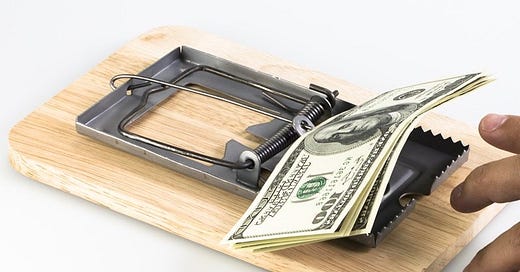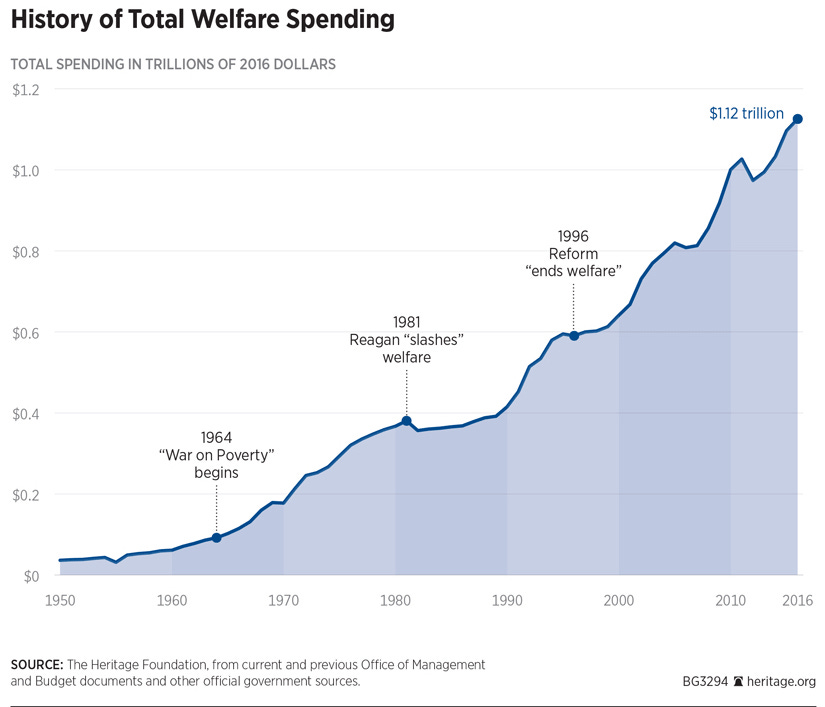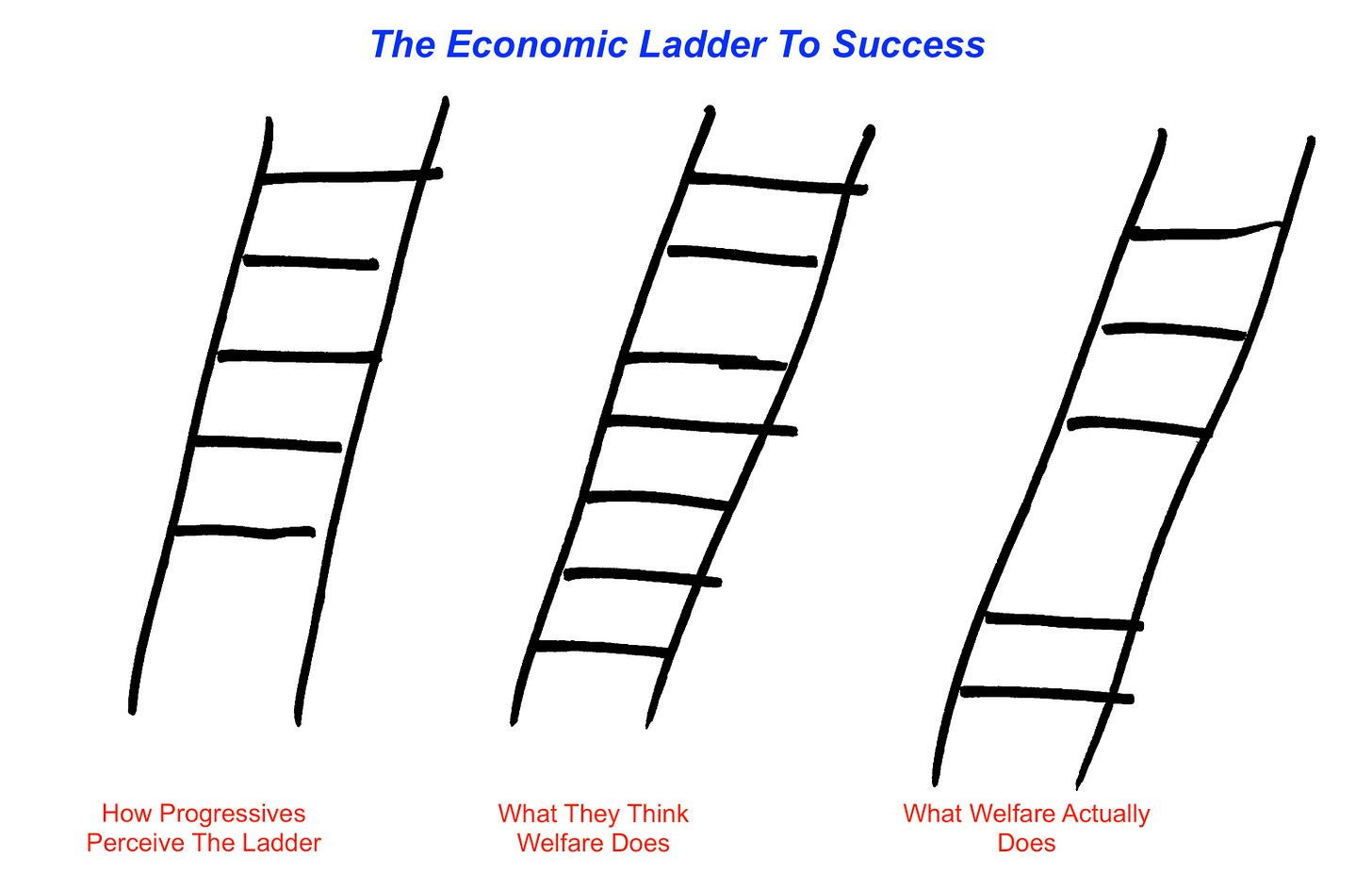My family ran a 24/7 restaurant for forty years. I was involved in the latter twenty, and to call it an immersive experience doesn't begin to tell the tale. Staffing was among the perpetual headaches. A "full roster," i.e. no job openings, was a rare occurrence, and even then we had employees who we tolerated rather than celebrated, because in the restaurant world, every problem is immediate and you do what you have to do to get through the day.
Among the headaches were the job applicants (usually for waiter positions - the most transient of all our jobs) who wanted to work "off the books," because they were on public assistance of some sort. I cannot count the number of times I heard "If I work more than X hours or make more than Y dollars a week, I'll lose my insurance or my benefits check." We didn’t do “off the books,” so we ended up offering them part-time gigs.
This phenomenon is characterized as the Welfare Trap or Welfare Cliff, as illustrated by this chart:
It's well understood but under-discussed and almost never reported on by a press corps who never, it seems, has anything bad to say about the government doling out money to those of lower incomes. That's not only the progressive way, it's the extent of the mission. Once those checks start flowing, the attitude of many is "our work is done here," with no regard as to the actual impact of that largesse.
People can be excused for not taking deep-dives into the government policies they support. There are only so many hours in a day, and most of them are taken up by work, sleep, baseline lifestyle activities (e.g. those involving food, hygiene, travel, familial obligations, and so forth), and the remaining time, where the word "discretionary" becomes relevant, gets divvied across many competing interests. Excused, up to a point. Taxation is coercion, no matter how you dress it up or how many good intentions and utilitarian arguments you apply to it, and as such it deserves more than just a passing "I'll vote so that the poor get help from the government" rationalization. The medical principle "first, do no harm" should extend to this and other matters, and the consequences of policies must be given as much attention as the intentions.
LBJ's Great Society, which marked the advent of an explosion of welfare programs, was the beginning of "institutionalized" poverty, with the welfare trap serving as one obstacle to economic ascendance.
Some analogize the role of welfare in the "ladder to success" as a situation where the government adds in missing bottom rungs, enabling the individual to more easily climb. Experience shows us that, rather than adding rungs, it removes them from somewhere in the middle.
If you start earning more money on your own, but your benefits decrease faster than your income increases, you're faced with a dilemma. Push through, knowing that your living standards are going to decrease before they increase? Or settle for a ceiling on your economic prospects? While some have the guts and self-discipline to bull through, many find it too difficult, especially if taking a step backward in overall income means they can't afford the apartment they're in or the day-to-day routine they currently live. The alternative, “off the books” work,” comes with its own problems, even when it can be found in an increasingly cashless society.
The economic harm done by the welfare state isn't where it ends, unfortunately. It also bears the blame for the degradation of the nuclear family.
The brilliant Thomas Sowell was asked by Peter Robinson of the Hoover Institute, "Why does the welfare state dissolve the family structure?"
For one thing, it makes it unnecessary for fathers to support their offspring, and in fact, it makes it counterproductive in many cases. A very poor man who might be able to support his family realizes his family will be better off without him. But on the other hand, someone who's strictly irresponsible, either the man or the woman or both, now pays no price for being irresponsible. The taxpayers pay the price. And, actually, the harm done to the taxpayers, which is serious, still is not comparable to the harm done to the families, especially the children.
Sowell also notes that the marriage rate among black families was higher than among white as recently as the 1920s, a datum that puts the lie to the notion that slavery is the root cause for the illegitimacy among blacks.
Echoing Sowell, we have Walter E. Williams asserting:
The welfare state has done to black Americans what slavery couldn't do….And that is to destroy the black family.
All this "let's empower the government to help the poor" has done tremendous (and certainly irreparable to the generations of the past three quarters of a century) harm to the communities the sentimentalists targeted for their help. Charity has always been considered a virtue in every society we might deem successful, and there are biological impulses toward helping others. Then, socialistic thinking came along, ushering in what David Mamet dubbed the "abdication of responsibility." People, rather than dipping into their own pockets to help the less fortunate, dipped into others' pockets.
Somehow, somewhen, the notion that this also constituted charity took root.
It's a lie.
Giving away someone else's money is not charity.
And, as recently noted by my blog-league David Woods, government's ubiquitous 'helping hand' is treated by many as an absolution from any obligation to reach into their own wallets. That stacks on top of government's monopolistic attitude toward charity. Beyond the countless restrictions it imposes on private efforts (former NYC Mayor Mike Bloomberg banned donated bagels from city food shelters), the most socialistic-minded among us (looking at you, Bernie Sanders) believe that private charity is a Bad Idea.
This stems, at least in part, from a more generalized opposition to personal liberty and freedom of action, itself born of the premise that the Best-and-Brightest are more capable of running society and all our lives than the "invisible hand" of the market and the uncertain nature of unrestrained individual human activity. The money that someone takes out of his own savings in order to help others is money, in their eyes, that becomes unavailable for use as they deem best.
The empirical evidence is that the Best-and-Brightest have not managed to make things better by usurping our liberties and claiming authority over efforts to help the poor. I write "authority" rather than "responsibility" because they don't bear any responsibility. They pay no price, other than an occasional electoral loss in a sea of statist victories, for screwing up families, for trapping generations in poverty, for unraveling the societal ties that unite a nation, and for replacing them with exhortations to eternal victimhood, zero-sum competitiveness, and division along multiple demographic lines.
A good friend, libertarian to the core, urges in his writings and political discourse that "men, marry your baby mamas." Many believe that urging a restoration of the perceived value of the nuclear family is "conservative" and an attitude of the past, and therefore de facto a Bad Thing to be rejected, but not everything old is Bad. There's a reason that most of human history involves two parents raising their offspring, and that evolution wired us into feeling and answering that obligation. Far from being a “conservative” issue, the nuclear family is a data-driven one.
Does this mean that the only way to successfully raise children is via a traditional mother-and-father household? Of course not. Single parents can be and have been successful. Ditto for same-sex couples. The crux is responsibility, rather than its abdication. In underwriting (and encouraging) that abdication, the welfare state harms where it seeks to help. In creating the "trap," the welfare state hinders self-reliance and self-advancement. In subsidizing parenting, the welfare state rewards irresponsibility and the abdication of duty to the offspring people created.
Empowering the collective "we," i.e. substituting a faceless "government" for individual action and taking comfort in empowering that government to seize others' money in lieu of freely offering one's own, may produce surface "feel-good" emotions. This impels the ignoring of the harm those actions cause, because admitting error is hard, and because taking back responsibility that was substituted away is challenging. We must, however recognize the harm all those good intentions produced if they are to be remedied. Otherwise, we face the doom cycle of ever-more money being pumped into a welfare state incentivized to grow, rather than shrink, by that money.
The War on Poverty, much like the War on Drugs, the War on Crime, and the War on Terror, is a positive-feedback machine and bottomless money pit. The system it created has no interest in dissolving itself via success or victory. Like your average politician, its first interest is self-perpetuation, an interest that overrides its mission.
That interest also corrodes all it touches.
America has spent over twenty-five TRILLION dollars on welfare since LBJ's Great Society began. The War on Poverty, costing multiple times what America has spent on all the actual wars she's ever fought, has not made a dent in that poverty. Its true fruits: millions trapped in perpetual dependence, a society less capable of sustaining itself absent massive taxation and redistribution, a breakdown of family structures, and a generalized sense of greater unhappiness despite the vast growth of societal wealth (thanks to capitalism's perpetual ability to overcome the statists) are all rotten. To their core.








David Graf: "private charity at no time in history has proved sufficient."
But, at no time in history has governmental wealth redistribution proven effective.
At EVERY point in history, minimal government and maximum individual liberty has increased the standard of living for all.
“America has spent over twenty-five TRILLION dollars on welfare since LBJ's Great Society began. The War on Poverty, costing multiple times what America has spent on all the actual wars she's ever fought, has not made a dent in that poverty.”